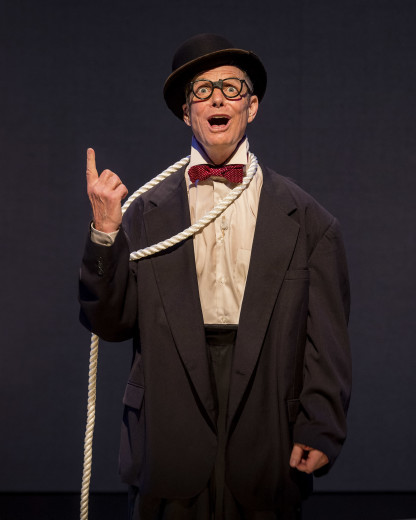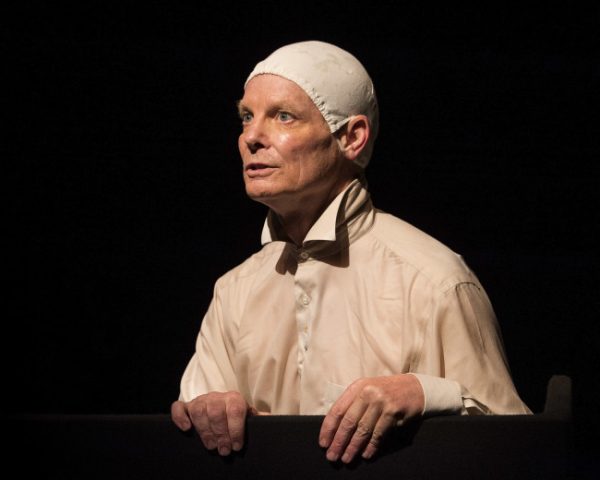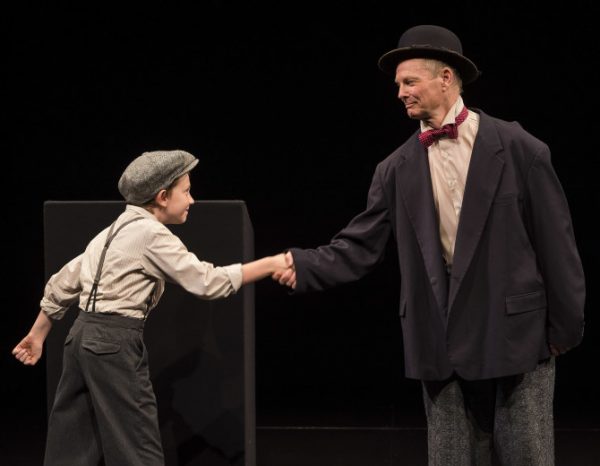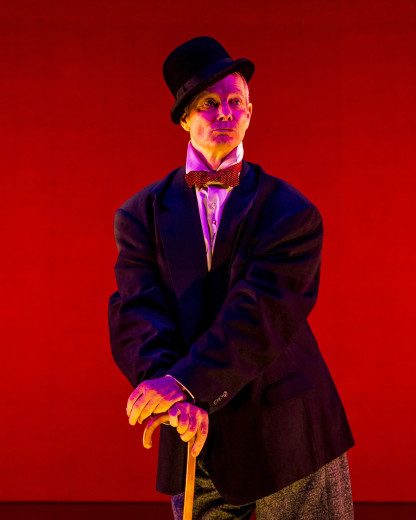It’s unclear if many of the people attending Bill Irwin’s opening night at the Kirk Douglas Theatre in Culver City on September 18 had any inkling of what his show would be. Beckett, of course, Beckett yes, but Beckett how and Beckett what?
The show is advertised as New York City’s Irish Theatre production of On Beckett, where it opened last year. It was developed starting three years ago with input from Carey Perloff, the then-Artistic Director of San Francisco’s American Conservatory Theatre. It was refined with more workshopping and that off-Broadway run on the way to here.

Irwin is a clown supreme, impossibly versatile, talented enough to also be a television, film and Tony-winning actor, plus a director and writer who has been everywhere, done everything — regional theatre, Sesame Street, both Broadways on and off, including diving into such deep drama as O’Neill’s The Iceman Cometh and Albee’s Who’s Afraid of Virginia Woolf? (Tony for Best Actor), plus, yes, Beckett.
Not only Beckett’s Waiting For Godot, in an early production with Steve Martin and the late Robin Williams, and another in 2009 with that other super clown, Nathan Lane, but also Beckett’s prose, with enigmatic titles (Not I, Rockaby, The Unnamable) and Beckett’s texts, some called texts for nothing, others with only numbers for identification.
Despite the endless credits, it’s as a clown that Irwin is most readily recognized, with original works spread over many years that include The Regard of Flight, Largely New York, Fool Moon and Old Hats, these last two co-created with his occasional partner in crime, clown king David Shiner.

One could go on, but the point is that some of the expectation at the Kirk Douglas was for another splendid one-man clown show closely relating to or involving Beckett. So to discover that the Bill Irwin who surfaced at the Douglas was, at least in part, professor Irwin, was a surprise.
Not unpleasant, not without its several high moments, but different, more sober and leaning professorial rather than clownish, although there is that in this show too. Understand this: nothing Irwin does could alienate an audience. But when he introduces his evening with the words, “I want to share with you some passages from the writings of Samuel Beckett… and in between these passages to share with you some thoughts on having lived with this language, and spoken it to audiences, over many years…,” we are sauntering down a somewhat different road.
This evening with Bill Irwin is an illustrated lecture on the unduplicatable verbal language of Samuel Beckett, what Irwin calls Beckett’s “particular language.” That language has been haunting him since he first discovered it, which is when, he tells us, it rooted itself irretrievably in his actor’s mind in ways he can still barely explain.
But he does explain, or try to, and he keeps it at once reverential and friendly and we never doubt that both attitudes are true. This is not an actorish obsession. Irwin offers up what reasons he can for why he cannot erase Beckett’s words from his brain. It’s a connection he feels deeply. When he says it haunts him, we believe him even if/when we can’t lay claim to a similar all-consuming and anguishing experience.

Irwin has called Beckett’s pronouns “slippery,” but all of Beckett’s language is slippery. What Irwin shares of it is dense, intense, circuitous; it is an opaque kind of stream-of-consciousness that bounces all over the map as if unable to stop itself, and the meaning of which—what we can detect in what there is of it—we grasp more by inference and emotion rather than clarity.
Fortunately, Irwin illustrates all with some of his clowning, inviting us to see how clowning works to alter realities, how he can be shorter or taller by invoking a trick or two, how rapidly a performance can change with a substitution of hats, especially, also baggy pants, a cloak.
And the more we learn the more we want to see. Since we know Irwin as a performer of exceptional elasticity, we hunger, perhaps unreasonably, for more than the brief segments of that elasticity on view here. They feel like some delicious hors d’œuvre served in anticipation of a sumptuous meal that doesn’t arrive.
So where does that place us? In a grateful yet wanting place, a kind of Beckettian no-man’s-land that Beckett would instantly recognize and where one suspects Samuel Beckett resided for most of his life.

Irwin’s exceptional skills, physical and verbal, are as sharp as ever. But lecturing or verbally explaining his feelings to us in a slightly overextended lecture/performance puts us on a diet that yearns for more of his physical genius. We love that part of him too much to not miss it. It is the thing we crave, and even envy, since we all have brains and bodies that we wish we could manipulate to do all of the aspirational things that Irwin does with his.
If only…
A savvy friend referred to On Beckett as a master class on acting. It is absolutely that and more. But greed wouldn’t pay. A little of Bill Irwin is a whole lot more than just about any feast anyone else could offer.
Top image: Professor Bill Irwin in On Beckett at the Kirk Douglas Theatre in Culver City.
Photos by Craig Schwartz
WHAT: The Irish Theatre production of Bill Irwin’s On Beckett.
WHERE: Center Theatre Group/Kirk Douglas Theatre, 9820 Washington Blvd., Culver City, CA 90232.
WHEN: Tuesdays-Fridays, 8pm; Saturdays, 2 & 8pm; Sundays, 1 & 6:30pm. Dark Mondays.
HOW: Tickets: $30–$75 (subject to change), available online at CenterTheatreGroup.org or (213) 972-4400 or in person at the CTG Box Office at The Ahmanson Theatre downtown. Groups: (213) 972-7231. Deaf community: Info and charge, at CenterTheatreGroup.org/ACCESS.
PARKING: Free 3-hour covered parking at City Hall, (validation available in the Kirk Douglas lobby).
